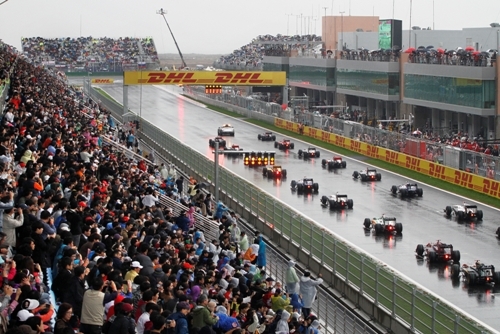Korea keen to host major international events, but are they worth it?
In 2006 when South Jeolla Province assembly member Jang Il first received a proposal from the provincial government to host the Formula One Grand Prix, he did not know much about the event.
But he believed that drawing one of the world’s biggest sporting occasions would boost the regional economy and help bring in tourists.
Five years later, Jang faces mounting bills and growing criticism rather than tangible economic benefits.
The F1 organizer paid a $36 million commission fee to the Formula One Management, the sport’s commercial rights holder, for the Korean GP in 2010. To continue hosting the event, they must pay 110 percent of the previous year’s payment each year.
An official from the South Jeolla government admitted that the F1 race could generate a maximum total revenue of about $23 million. This means there is no chance of making a profit from the Grand Prix. But Korea Auto Valley Operation, the operating body of the F1 Korean Grand Prix, did not reveal the full details when they signed the contract.
South Jeolla Province government asked the provincial assembly last week to sign a 198 billion won ($174 million) loan to continue hosting F1 Grand Prix, in Yeongam.
The money would be used to pay off the debts of the local government, which provided hundreds of billions won to construct the 5.61-kilometer race track in Yeongam.
“We’re in a dilemma. If we issue the loan, it will burden the taxpayers. But if we refuse it, the local organizers will go bankrupt, which will seriously damage our international reputation,” Jang said.

In the last decade, South Korea has hosted a series of mega sporting events, including the 2002 FIFA World Cup, 2011 IAAF World Athletics Championships and the Korean Grand Prix. And local cities are trying to attract more international competitions to boost the economy and get the world’s attention.
However, like Jang, many express misgivings about whether such short-term stimulus is sufficient recompense for the large sums of money pumped into hosting the mega events.
The case of the debt-ridden F1 organizers suggests that it may be high time to revisit a serious question: Are all big events worth holding?
Money-losing game
Korea hosted the country’s first F1 Grand Prix in October 2010 on the newly built circuit in Yeongam, South Jeolla Province.
The local organizer managed to host the racing event after frantic last-minute work to complete the circuit. But KAVO came under fire after the race for its lax preparation and poor marketing.
The Board of Audit and Inspection which launched an inquiry earlier this year into the financial soundness of the F1 organizer discovered that its debt has grown to more than 500 billion won ($438 million).
What is more worrying is the fact that the South Jeolla Province has already signed on to host the money-losing race for seven years with an option to extend for five more years.
When they first brought the event here, the organizers had a rosy picture that they could make big money ― more than 110 billion won ($93 million). But in reality, the exclusive, luxury sporting event will make a loss of 485 billion won ($410 million) by 2016, according to the Board of Audit and Inspection.
Lessons for the future
Observers say that South Jeolla’s case should be a lesson for other local governments preparing to host sporting events.
Korea’s next big event is the 2014 Asian Games in Incheon. The city will host Asia’s biggest sporting event from Sep. 19 to Oct. 4 in 2014. For the 16-day extravaganza, Incheon has pledged to build 16 new competition venues, including a 60,000-seat main stadium by July 2014, with more than 1.5 trillion won ($1.2 billion) of public funds.
Gwangju will also build a new swimming pool and multi-purpose gymnasium as well as an athletes’ village for up to 14,400 people ahead of the 2015 Summer Universiad Games.
PyeongChang in Gwangwon Province, which won the right to host the 2018 Winter Games, also needs to build six additional competition venues.
Many local taxpayers, however, are now beginning to wonder whether all the sports venues are worth the expense. People have witnessed the downside to such major construction projects since 2002 when Korea co-hosted the World Cup with Japan.
At that time, in order to bring the event here, the country had to build 10 football stadiums. All the stadiums, except the Seoul World Cup Stadium, have been operating at a loss for years. Professor Chung Hee-joon of the sports and leisure studies department, Dong-A University, said that the local organizers should learn not to build stadiums that will not be used.
“PyeongChang should look again at their games’ plan. They promised to build four new ice venues in Gangneung, including a new ice hockey stadium. Gangneung is a small city with a population of just over 200,000. I think these stadiums will never be used again after the games end,” Chung added.
An early economic impact assessment by Korea Institute for Industrial Economics and Trade projected that the 2018 games would create 230,000 jobs and that the total production inducement effect would total more than 20 trillion won ($18.8 billion).
But Chung begged to differ, saying that the organizers tend to count only the possible profits, but not the inevitable costs.
“Before hosting any event, we should ask whether the benefits to be gained will outweigh the cost of the events,” Chung said.
On Thursday, the South Jeolla Province assembly will convene a meeting to decide whether they should allow aid loans to the F1 organizers.
“I wouldn’t have signed to bring F1 race here if I had known it would cost this much. But it’s too late,” Jang said.
By Oh Kyu-wook (596story@heraldcorp.com)



![[Herald Interview] 'Amid aging population, Korea to invite more young professionals from overseas'](http://res.heraldm.com/phpwas/restmb_idxmake.php?idx=644&simg=/content/image/2024/04/24/20240424050844_0.jpg&u=20240424200058)






![[Hello India] Hyundai Motor vows to boost 'clean mobility' in India](http://res.heraldm.com/phpwas/restmb_idxmake.php?idx=644&simg=/content/image/2024/04/25/20240425050672_0.jpg&u=)







